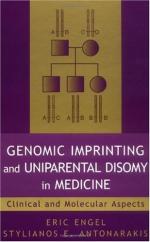|
This section contains 609 words (approx. 3 pages at 300 words per page) |

|
Normally, individuals inherit their chromosomes in a manner that each pair consists of one homologue from each parent. The genetic state in which both copies of a particular chromosome (or part of a chromosome) have been inherited from only one parent is named uniparental disomy (UPD). UPD is a term to describe a class of anomalies belonging to nontraditional inheritance. In most cases of UPD, the karyotype appears completely normal. DNA markers are the only way to determine the one parent origin for each chromosome. Molecular analysis shows that the disomy can be the result of two copies of the same chromosome (isodisomy) coming from one parent carrying identical genes (i.e., from one grandparent), or of a pair of chromosomes (heterodisomy) coming from one parent but carrying different genes (i.e., from both grandparents). The incidence of UPD is estimated to be as high as...
|
This section contains 609 words (approx. 3 pages at 300 words per page) |

|


